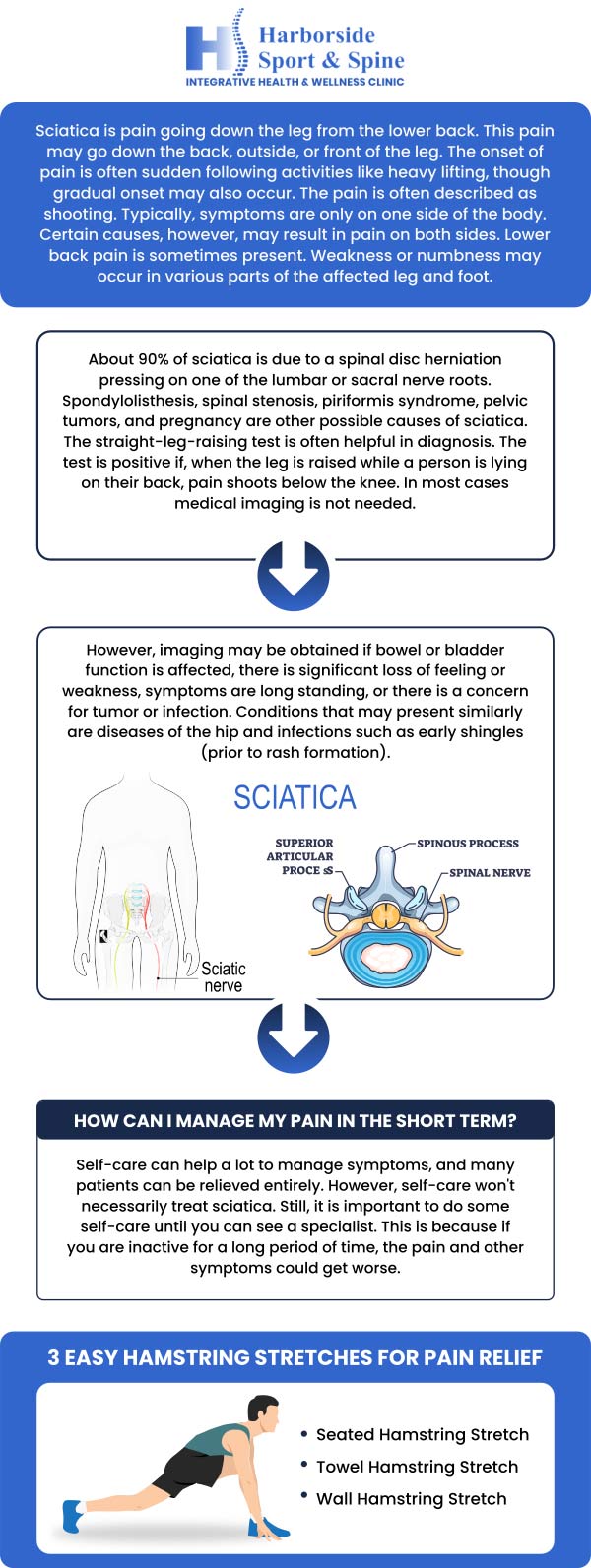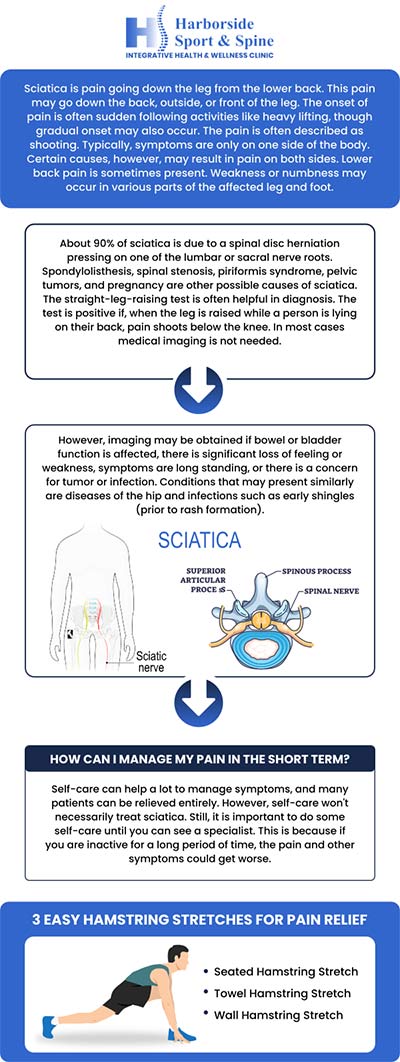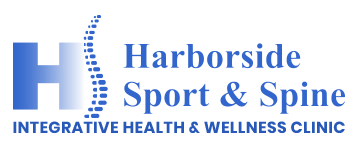When Should I Visit a Sciatica Pain Doctor?
When the sciatic nerve is inflamed by muscular spasms or other lower back issues, symptoms can spread to the back, hips, and legs. Sciatica symptoms that can accompany lower back problems include pain, numbness, weakness, and tingling. Our providers can assist you in determining the best treatment to address the source of your sciatica symptoms and provide you with relief. To discover sciatica pain relief, contact Harborside Sport & Spine. We are conveniently located at 75 Montgomery Street, Suite 603 Jersey City, NJ 07302. For more information, please contact us or request an appointment online.


Table of Contents:
When to see a doctor for sciatica pain at Harborside Sport & Spine?
When is sciatica pain a medical emergency?
How long does it take for a sciatic nerve to feel better?
How long does a pinched sciatic nerve last?
Sciatica is a common condition caused by inflammation or injury to the sciatic nerve, which runs from the lower back, down through the leg, and all the way to the foot. It results in lower back and leg pain, though it can also cause weakness or numbness in the affected area. Sciatica can often be treated at home via medication and home care remedies, but severe cases require treatment from a medical professional.
Sciatica pain can usually be treated at home through rest and self-care and should dissipate over the course of a few weeks. However, this isn’t always the case, and more severe cases will require medical treatment from physical therapists at Harborside Sport & Spine.
If you’re still experiencing pain after a few weeks or if your symptoms start to get worse, then it’s time to book an appointment with a professional for further evaluation and treatment.
You should call 911 immediately if you experience loss of leg movement, loss of sensation, or loss of bowel or bladder control, as these symptoms may be indicative of a more serious medical condition.
If you’re experiencing the following symptoms alongside your sciatic pain, you should seek immediate evaluation and treatment from a medical professional:
● Changes in bowel and/or bladder control. This includes an inability to control your bowel and/or bladder movements, difficulty in passing urine, loss of urinary sensation, inability to pass urine, or a poor urine stream. These symptoms, in combination with sciatic pain, may indicate a serious medical condition called cauda equina syndrome. Cauda equina syndrome typically requires immediate surgery to alleviate symptoms. Without prompt treatment, it can result in permanent difficulty walking, hindered lower limb function, and lower-body paralysis.
● Severe neurological symptoms. Damage to your sciatic nerve can cause progressive neurological symptoms in one or both legs that should be assessed immediately by a medical practitioner. These symptoms include numbness, weakness, tingling, increased sensitivity to pain, compromised leg functionality, or abnormal sensations (such as pinpricks). Failure to treat these severe neurological symptoms can result in irreversible nerve damage. Neurological symptoms may also indicate slow-onset cauda equina syndrome so it’s important to seek treatment immediately and not post-pone.
You should also seek immediate medical attention if your sciatica symptoms coincide with a recent accident or injury, fever or nausea, or unrelenting pain, as these may indicate a serious medical condition such as a tumor or infection.
On average, most sciatica issues last between 4–6 weeks. However, this may be longer or shorter depending on the severity of the injury and the location of the sciatic damage. Anything over 6 weeks without improvement is considered chronic and should be discussed with your primary physician.
It’s important to note that sciatic pain may feel different to different people. Some people experience acute pain that is stabbing or shooting in nature. Others may feel a burning sensation or a dull, radiating ache. When in doubt about whether the pain you’re experiencing stems from your sciatic nerve, contact your doctor or a sciatic pain specialist.
Pain and discomfort resulting from a pinched nerve shouldn’t last more than 4 to 6 weeks.
Recovery can be bolstered by reducing the inflammation in the nerve through at-home remedies such as icing, resting, elevating, and gently stretching. Contacting your doctor or chiropractor for an individualized treatment plan, on the other hand, can help you address the problem and resolve it more quickly.
For more information about our sciatic treatments, contact us at Harborside Sport & Spine. Our specialists provide exceptional comfort, care, and treatment to get you back to feeling your best. For more information contact us or schedule an appointment online. We serve patients from Jersey City NJ, Hoboken NJ, Weehawken NJ, West New York NJ, Guttenberg NJ, Secaucus NJ, Harrison NJ, Kearny NJ, Newark NJ, Belleville NJ, Lyndhurst NJ, East Orange NJ and Elizabeth NJ.
Check Out Our 5 Star Reviews


Chiropractic and Physical Therapy Services
▸ Chiropractic
▸ Physical Therapy
▸ Massage Therapy
▸ Acupuncture
▸ Spinal Decompression
▸ Prenatal Chiropractor
▸ Ear Infections
▸ Foot Pain
▸ Headaches
▸ Scoliosis
▸ Slipped Disc
▸ Sprained Ankles
▸ Stress
▸ Frozen Shoulder
▸ Osteoporosis
▸ Shoulder Pain






